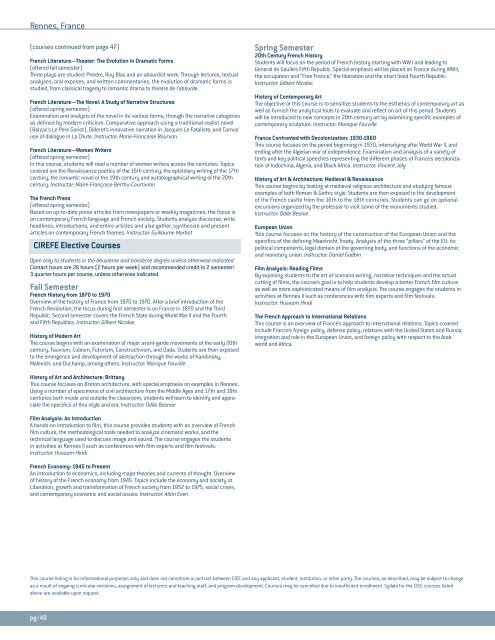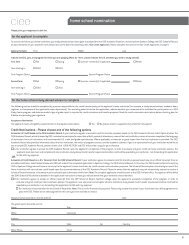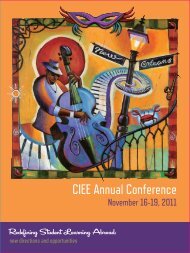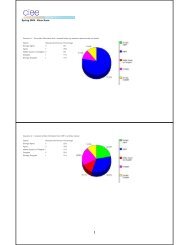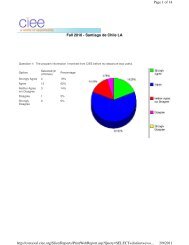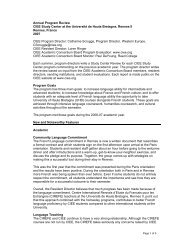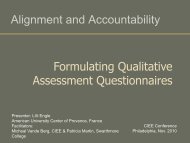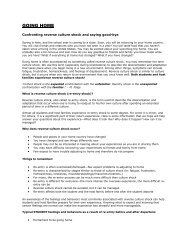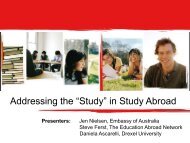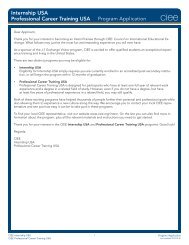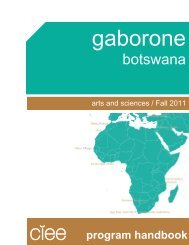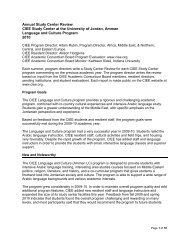studyeurope - Council on International Educational Exchange
studyeurope - Council on International Educational Exchange
studyeurope - Council on International Educational Exchange
- No tags were found...
Create successful ePaper yourself
Turn your PDF publications into a flip-book with our unique Google optimized e-Paper software.
Rennes, France(courses c<strong>on</strong>tinued from page 47)French Literature—Theater: The Evoluti<strong>on</strong> in Dramatic Forms(offered fall semester)Three plays are studied: Phedre, Ruy Blas and an absurdist work. Through lectures, textualanalyses, oral exposes, and written commentaries, the evoluti<strong>on</strong> of dramatic forms isstudied, from classical tragedy to romantic drama to theatre de l’absurde.French Literature—The Novel: A Study of Narrative Structures(offered spring semester)Examinati<strong>on</strong> and analysis of the novel in its various forms, through the narrative categoriesas defined by modern criticism. Comparative approach using a traditi<strong>on</strong>al realist novel(Balzac’s Le Pere Goriot), Diderot’s innovative narrati<strong>on</strong> in Jacques Le Fataliste, and Camus’use of dialogue in La Chute. Instructor: Marie-Francoise Bourv<strong>on</strong>French Literature—Women Writers(offered spring semester)In this course, students will read a number of women writers across the centuries. Topicscovered are the Renaissance poetics of the 16th century, the epistolary writing of the 17thcentury, the romantic novel of the 19th century and autobiographical writing of the 20thcentury. Instructor: Maire-Françoise Berthu-Courtivr<strong>on</strong>The French Press(offered spring semester)Based <strong>on</strong> up-to-date press articles from newspapers or weekly magazines, the focus is<strong>on</strong> c<strong>on</strong>temporary French language and French society. Students analyze discourse, writeheadlines, introducti<strong>on</strong>s, and entire articles and also gather, synthesize and presentarticles <strong>on</strong> c<strong>on</strong>temporary French themes. Instructor: Guillaume MarbotCIREFE Elective CoursesOpen <strong>on</strong>ly to students in the deuxième and troisième degrés unless otherwise indicated.C<strong>on</strong>tact hours are 26 hours (2 hours per week) and recommended credit is 2 semester/3 quarter hours per course, unless otherwise indicated.Fall SemesterFrench History from 1870 to 1970Overview of the history of France from 1870 to 1970. After a brief introducti<strong>on</strong> of theFrench Revoluti<strong>on</strong>, the focus during first semester is <strong>on</strong> France in 1870 and the ThirdRepublic. Sec<strong>on</strong>d semester covers the French State during World War II and the Fourthand Fifth Republics. Instructor: Gilbert NicolasHistory of Modern ArtThe course begins with an examinati<strong>on</strong> of major avant-garde movements of the early 20thcentury. Fauvism, Cubism, Futurism, C<strong>on</strong>structivism, and Dada. Students are then exposedto the emergence and development of abstracti<strong>on</strong> through the works of Kandinsky,Malevich, and Duchamp, am<strong>on</strong>g others. Instructor: M<strong>on</strong>ique FouvilleSpring Semester20th Century French HistoryStudents will focus <strong>on</strong> the period of French history starting with WW I and leading toGeneral de Gaulle’s Fifth Republic. Special emphasis will be placed <strong>on</strong> France during WWII,the occupati<strong>on</strong> and “Free France,” the liberati<strong>on</strong> and the short lived Fourth Republic.Instructor: Gilbert NicolasHistory of C<strong>on</strong>temporary ArtThe objective of this course is to sensitize students to the esthetics of c<strong>on</strong>temporary art aswell as furnish the analytical tools to evaluate and reflect <strong>on</strong> art of this period. Studentswill be introduced to new c<strong>on</strong>cepts in 20th century art by examining specific examples ofc<strong>on</strong>temporary sculpture. Instructor: M<strong>on</strong>ique FouvilleFrance C<strong>on</strong>fr<strong>on</strong>ted with Decol<strong>on</strong>izati<strong>on</strong>: 1930-1960This course focuses <strong>on</strong> the period beginning in 1930, intensifying after World War II, andending after the Algerian war of independence. Examinati<strong>on</strong> and analysis of a variety oftexts and key political speeches representing the different phases of France’s decol<strong>on</strong>izati<strong>on</strong>of Indochina, Algeria, and Black Africa. Instructor: Vincent JolyHistory of Art & Architecture: Medieval & RenaissanceThis course begins by looking at medieval religious architecture and studying famousexamples of both Roman & Gothic style. Students are then exposed to the developmentof the French castle from the 16th to the 18th centuries. Students can go <strong>on</strong> opti<strong>on</strong>alexcursi<strong>on</strong>s organized by the professor to visit some of the m<strong>on</strong>uments studied.Instructor: Odile BesnieEuropean Uni<strong>on</strong>This course focuses <strong>on</strong> the history of the c<strong>on</strong>structi<strong>on</strong> of the European Uni<strong>on</strong> and thespecifics of the defining Maastricht Treaty. Analysis of the three “pillars” of the EU: itspolitical comp<strong>on</strong>ents, legal domain of the governing body, and functi<strong>on</strong>s of the ec<strong>on</strong>omicand m<strong>on</strong>etary uni<strong>on</strong>. Instructor: Daniel GadbinFilm Analysis: Reading FilmsBy exposing students to the art of scenario writing, narrative techniques and the actualcutting of films, the course’s goal is to help students develop a better French film cultureas well as more sophisticated means of film analysis. The course engages the students inactivities at Rennes II such as c<strong>on</strong>ferences with film experts and film festivals.Instructor: Hussam HindiThe French Approach to Internati<strong>on</strong>al Relati<strong>on</strong>sThis course is an overview of France’s approach to internati<strong>on</strong>al relati<strong>on</strong>s. Topics coveredinclude France’s foreign policy, defense policy, relati<strong>on</strong>s with the United States and Russia,integrati<strong>on</strong> and role in the European Uni<strong>on</strong>, and foreign policy with respect to the Arabworld and Africa.History of Art and Architecture: BrittanyThis course focuses <strong>on</strong> Bret<strong>on</strong> architecture, with special emphasis <strong>on</strong> examples in Rennes.Using a number of specimens of civil architecture from the Middle Ages and 17th and 18thcenturies both inside and outside the classroom, students will learn to identify and appreciatethe specifics of this style and era. Instructor: Odile BesnierFilm Analysis: An Introducti<strong>on</strong>A hands-<strong>on</strong> introducti<strong>on</strong> to film, this course provides students with an overview of Frenchfilm culture, the methodological tools needed to analyze cinematic works, and thetechnical language used to discuss image and sound. The course engages the studentsin activities at Rennes II such as c<strong>on</strong>ferences with film experts and film festivals.Instructor: Hussam HindiFrench Ec<strong>on</strong>omy: 1945 to PresentAn introducti<strong>on</strong> to ec<strong>on</strong>omics, including major theories and currents of thought. Overviewof history of the French ec<strong>on</strong>omy from 1945. Topics include the ec<strong>on</strong>omy and society atLiberati<strong>on</strong>, growth and transformati<strong>on</strong> of French society from 1952 to 1975, social crises,and c<strong>on</strong>temporary ec<strong>on</strong>omic and social issues. Instructor: Alain EvenThis course listing is for informati<strong>on</strong>al purposes <strong>on</strong>ly and does not c<strong>on</strong>stitute a c<strong>on</strong>tract between CIEE and any applicant, student, instituti<strong>on</strong>, or other party. The courses, as described, may be subject to changeas a result of <strong>on</strong>going curricular revisi<strong>on</strong>s, assignment of lecturers and teaching staff, and program development. Courses may be cancelled due to insufficient enrollment. Syllabi for the CIEE courses listedabove are available up<strong>on</strong> request.pg/36pg/48


